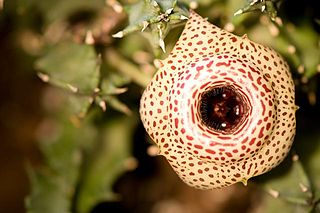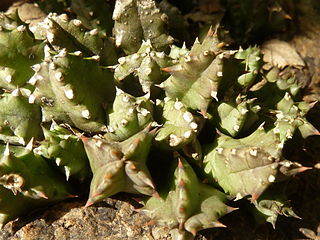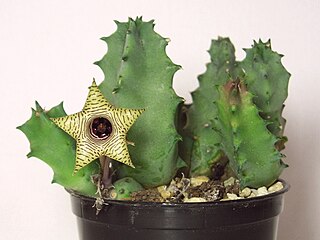
The Royal Horticultural Society (RHS), founded in 1804 as the Horticultural Society of London, is the UK's leading gardening charity.

Sparaxis is a genus of flowering plants called the harlequin flowers. It belongs to the iris family Iridaceae with about 13 species endemic to Cape Province, South Africa.

Horticulture is the art of cultivating plants in gardens to produce food and medicinal ingredients, or for comfort and ornamental purposes. Horticulturists are agriculturists who grow flowers, fruits and nuts, vegetables and herbs, as well as ornamental trees and lawns.

The genus Huernia consists of perennial, stem succulents from Eastern and Southern Africa and Arabia, first described as a genus in 1810.

Weigela is a genus of between six and 38 species of deciduous shrubs in the family Caprifoliaceae, growing to 1–5 m (3–15′) tall. All are natives of eastern Asia. The genus is named after the German scientist Christian Ehrenfried Weigel.

The Award of Garden Merit (AGM) is a long-established annual award for plants by the British Royal Horticultural Society (RHS). It is based on assessment of the plants' performance under UK growing conditions.

Kerria japonica, commonly known as Japanese rose or Japanese kerria, Japanese ヤマブキ Yamabuki ) Chinese 棣(棠花) Dì (is a deciduous shrub in the rose family Rosaceae, native to China, Japan and Korea. It is named after William Kerr, who introduced the cultivar 'Pleniflora'. It is the sole species in the genus Kerria.
The Victoria Medal of Honour (VMH) is awarded to British horticulturists resident in the United Kingdom whom the Royal Horticultural Society Council considers deserving of special honour by the Society.

Xanthium strumarium is a species of annual plants of the family Asteraceae. It probably originates in southern Europe and Asia, but has been extensively naturalized elsewhere.

Symphyotrichum ericoides, known as white heath aster, frost aster, or heath aster, is a species of flowering plant in the family Asteraceae native to much of central and eastern North America. It has been introduced to parts of Europe and western Asia.

Symphyotrichum novi-belgii, commonly called New York aster, is a species of flowering plant. It is the type species for Symphyotrichum, a genus in the family Asteraceae, whose species were once considered to be part of the genus Aster. Plants in both these genera are popularly known as Michaelmas daisy because they bloom around September 29, St. Michael’s Day.

Aloidendron pillansii, formerly Aloe pillansii, the giant quiver tree or bastard quiver tree, is a large, branching species of succulent plant indigenous to southern Africa. It is regarded as critically endangered.

Symphyotrichum pilosum, commonly called hairy white oldfield aster or frost aster, is a flowering plant in the family Asteraceae native to central and eastern North America. It is a perennial, herbaceous plant that may reach 20 to 120 centimeters tall. Its flowers have white ray florets and yellow disk florets.

Roderick Leon Bieleski was a New Zealand plant physiologist. As a botanist and horticulturist, his research focussed on understanding the factors that affected the behaviour of plants, in particular horticultural crops. His work had practical relevance to farmers and orchardists in building their understanding of these factors and taking account of them while making a living from growing and harvesting plants. He received many honours and awards, culminating in being appointed Member of the New Zealand Order of Merit (MNZM) in 2010.

Huernia zebrina, the little owl, is a species of flowering plant in the family Apocynaceae, native to Namibia, Botswana, northern South Africa, Zimbabwe, and Mozambique. A succulent, it has gained the Royal Horticultural Society's Award of Garden Merit.

Huernia guttata is a species of flowering plant in the family Apocynaceae, native to the southern Cape Provinces of South Africa. A succulent, it has gained the Royal Horticultural Society's Award of Garden Merit.

Huernia hystrix, the porcupine huernia, is a species of flowering plant in the family Apocynaceae, native to southeastern Africa. A succulent, it has gained the Royal Horticultural Society's Award of Garden Merit.

Huernia thuretii is a species of flowering plant in the family Apocynaceae, native to Namibia, and the Cape Provinces of South Africa. A succulent, as Huernia thurettii it has gained the Royal Horticultural Society's Award of Garden Merit.

















